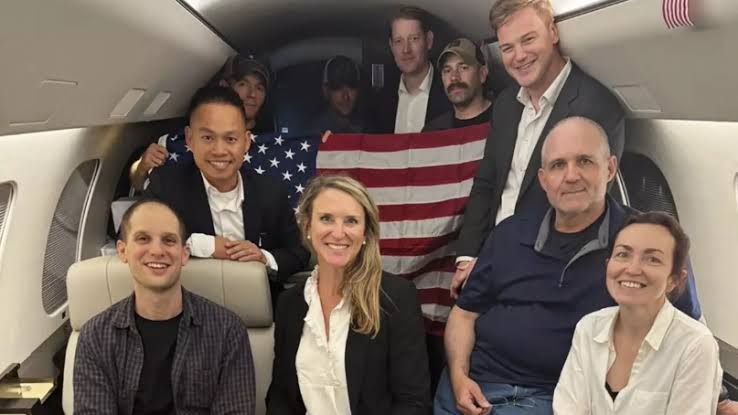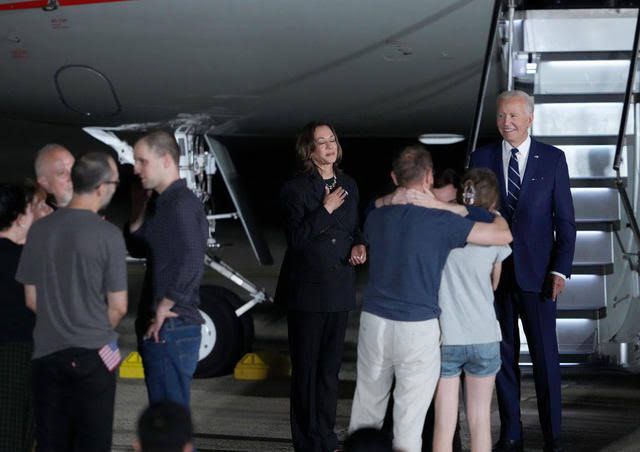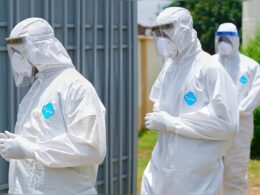In a significant diplomatic achievement, President Joe Biden and Vice President Kamala Harris greeted three American citizens who were released by Russia in a complex prisoner swap involving multiple nations.
The Americans—Wall Street Journal reporter Evan Gershkovich, Marine veteran Paul Whelan, and Russian-American radio journalist Alsu Kurmasheva—landed at Joint Base Andrews in Maryland late Thursday night.
The release of these individuals marks a high point in a carefully orchestrated exchange involving 24 detainees held across six different countries. This intricate negotiation saw contributions from Germany, Slovenia, Poland, and Norway, with the swap itself taking place on a tarmac in Ankara, Turkey, earlier in the day.
The Americans Freed

Evan Gershkovich, a reporter for the Wall Street Journal, was detained by Russian authorities earlier this year on charges that the U.S. government and his employer vehemently denied. His arrest had sparked an international outcry and intensified calls for his release. Marine veteran Paul Whelan had been held in Russia since 2018 on espionage charges, which he and the U.S. government have consistently refuted. Alsu Kurmasheva, a dual Russian-American citizen and journalist, was also among those released. She had been detained on charges related to her reporting.
Upon their arrival at Joint Base Andrews, the three Americans were warmly received by President Biden, Vice President Harris, and other senior officials. The emotional reunion underscored the U.S. administration’s commitment to securing the release of its citizens held abroad under contentious circumstances.
Vladimir Kara-Murza’s Release

Another notable figure, Vladimir Kara-Murza, a U.S. green card holder and a prominent Kremlin critic, was also released as part of the swap. Kara-Murza, known for his outspoken opposition to Russian President Vladimir Putin, had been detained on charges widely regarded as politically motivated. Unlike the others, Kara-Murza chose to travel to Germany following his release, as confirmed by White House national security adviser Jake Sullivan.
The Exchange

The exchange involved the release of 16 prisoners by Russia and the freeing of eight Russians held by Western nations. This elaborate swap required intricate negotiations and cooperation among multiple countries, reflecting the complexities of modern diplomatic engagements.
Germany, Slovenia, Poland, and Norway played pivotal roles in facilitating the exchange. Their involvement highlights the importance of international collaboration in addressing geopolitical tensions and human rights issues. The logistical challenges of coordinating such a swap were substantial, with Ankara, Turkey, serving as the neutral ground for the physical exchange of detainees.
Diplomatic Implications
This successful swap represents a rare moment of cooperation between Russia and the Western nations amid strained relations. The Biden administration has been under pressure to secure the release of Americans detained abroad, particularly those held under questionable charges. The return of Gershkovich, Whelan, and Kurmasheva is likely to be seen as a significant diplomatic victory for the current administration.
In his remarks following the arrival of the freed Americans, President Biden emphasized the importance of ongoing diplomatic efforts to secure the release of other Americans wrongfully detained overseas. He expressed gratitude to the allied nations that played a role in the negotiations, underscoring the collective effort required to bring the detainees home.
Reactions and Next Steps
The release has been met with widespread relief and celebration among the families and supporters of the freed individuals. The Wall Street Journal issued a statement expressing profound gratitude for the efforts that led to Gershkovich’s release, while advocacy groups that had campaigned for Paul Whelan’s freedom also lauded the successful negotiation.
Human rights organizations have welcomed the swap but continue to call for the release of other individuals detained under dubious charges around the world. The complex nature of such negotiations often means that many more remain imprisoned, awaiting similar diplomatic breakthroughs.










Join our Channel...